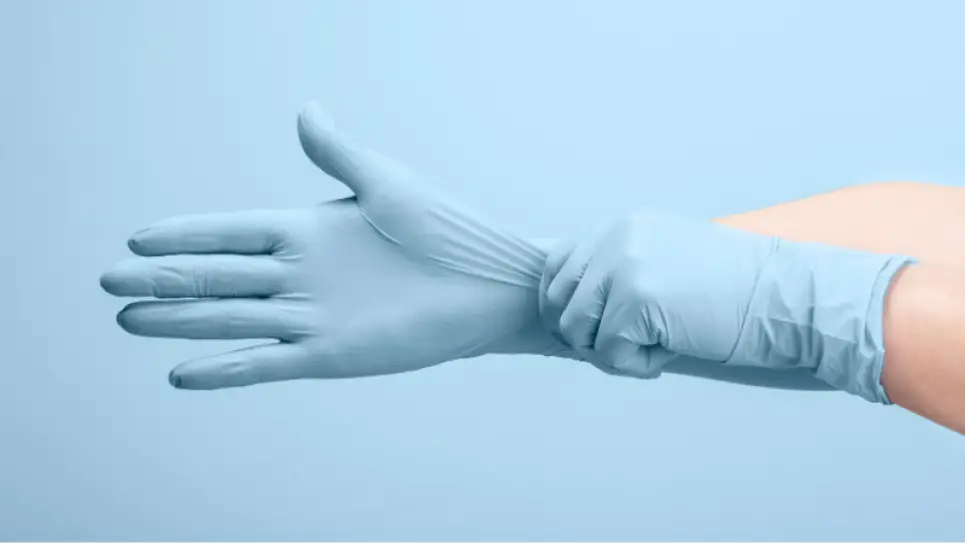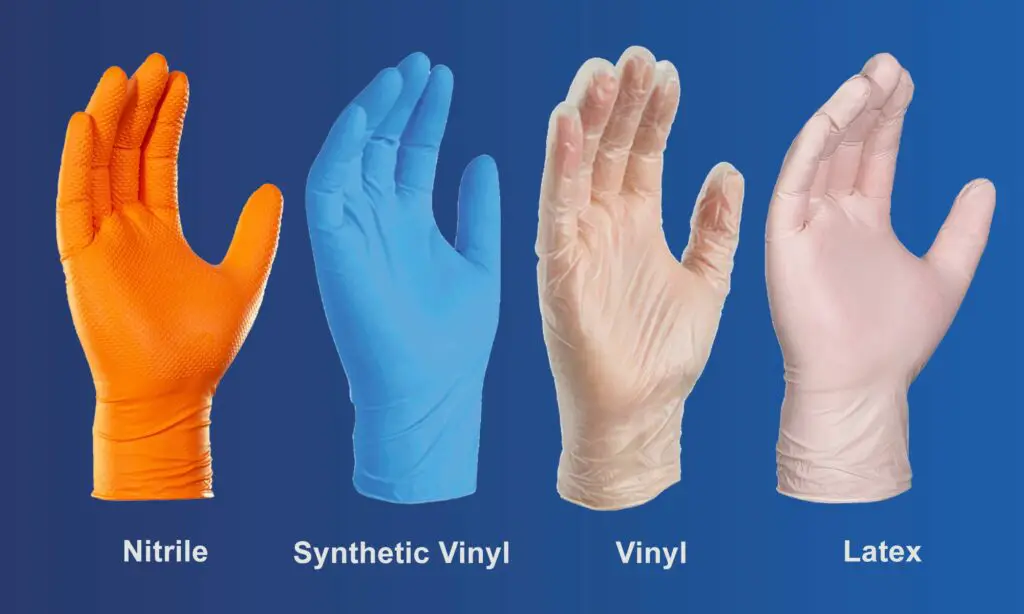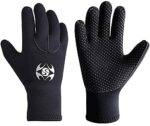When working with disposable gloves such as Vinyl, it’s obvious that safety is the first thing in mind.
Since vinyl gloves have been used for decades in almost every industry, it is a general notion that these are super gloves that’ll offer protection from all solvents.
In reality, nothing is impervious to everything. The opinion in such cases where safety is crucial should be objective, not subjective.
You expect Vinyl gloves to be impervious because they’re waterproof, but that’s not the only benchmark to impermeability.

Vinyl gloves are impervious to water. But they’re not impervious to hard acids, ketogenic solvents, and blood-borne pathogens. So, whether or not vinyl gloves are impervious depends on what purpose they’re being used for.
Does this resolve your query? Well, we’re not quite finished, yet. There’s a lot more you should know about vinyl gloves and the matter of safety.
This article sheds light on the use of vinyl gloves: the jobs they should and shouldn’t be used for, their advantages and limitations, and much more.
Dive right in!
Are vinyl gloves impermeable? The truth unraveled!
First of all, nothing is entirely impervious and vinyl gloves are no different. They’re impervious to water. Even oil can’t break their molecules apart very easily.
But, when it comes to acids and blood-borne pathogens, vinyl gloves do not offer adequate protection.
Advantages of vinyl gloves: Industries where they can be used!
Vinyl gloves are unbeatable when it comes to affordability. They’re undoubtedly the cheapest disposable gloves out there in the market. This very reason made them rule every industry for many decades.
Their usage is now limited to certain industries due to many reasons. However, those reasons are for a later section.
Here, we are focusing on the advantages of vinyl gloves besides the factor that cost is never going to be a limiting factor when bulk-buying vinyl gloves. Have a look!
1. Vinyl gloves are waterproof. They’re highly resistant to oil, grease, and fats as well.
2. They do not contain latex at all. Hence, if you have a latex allergy and cost is a concern, then vinyl gloves can save the day.
3. Vinyl gloves offer snug-fitting. Their surface is impervious to water and resistant to grease. Hence, they offer a very good grip while working.
The purposes where using vinyl gloves makes a lot of sense are as follows:
-
-
- Low-risk jobs like cleaning.
- Waste disposal.
- Printing and painting.
-
Limitations of vinyl gloves: Industries where they shouldn’t be used!
Vinyl gloves have been related to certain concerns (serious concerns) that put a question mark on their use in the future.
First of all, the biggest limitation is that vinyl gloves are not biodegradable. That’s a serious concern.
Some other concerns that plague the safety of vinyl gloves are as follows:
1. Vinyl gloves have BPA and phthalates. These constituents are serious threats to health.
2. The powdered version of vinyl gloves has cornstarch. Cornstarch that makes these gloves smoother is also the reason that these gloves are not safe for surgeries.
3. Vinyl gloves cannot protect you from blood-borne pathogens and high viral load. Hence, using them in the medical setup is a BIG IF.
4. The vinyl polymers can’t hold together against hard acids and ketogenic solvents. Your hands will be exposed to all sorts of dangers in such a setup.
You should be able to make out by now that vinyl gloves aren’t answers to every sector and every job.
Although all states in the US do not ban the use of vinyl gloves, there are certain industries where they shouldn’t be used. Here’s the list:
-
-
- In the medical sector where there’s a risk of contamination.
- Healthcare jobs such as nursing.
- Food preparation.
- Jobs that involve getting in touch with bodily fluids.
-
Is it illegal to use vinyl gloves as examination gloves?
The answer is both yes and no. It just depends on whether or not it has been declared illegal by your government yet.
However, using powdered vinyl gloves for surgeries isn’t allowed by many governments. In fact, the use of non-sterile vinyl gloves in medical setup isn’t recommended either.
Although the use of vinyl gloves as examination gloves might not put you in legal hassles in the US, as a first-hand health provider, you should restrict using these gloves for surgeries.
Vinyl Vs Latex Vs Nitrile: A quick comparison
You know the advantages and constraints of vinyl gloves by now. So, here we bring a bonus section on vinyl vs latex vs nitrile gloves that’ll help you decide which of the three is better for the job at hand. Let’s get started!

Resistance to chemicals
Vinyl gloves aren’t impervious to hard chemicals.
Latex gloves are resistant to chemicals to a better degree than vinyl gloves.
The degree of impervious nature of nitrile gloves is the best against acids. As long as you don’t surpass their limits, they’ll offer the best protection.
Bottom line: Vinyl gloves are not impervious to acids.
Non-allergenic
Latex gloves can be a nightmare for people with latex allergies. One of the reasons that many sectors look for alternative options is that latex sensitivity isn’t uncommon.
Vinyl gloves are suitable replacement gloves for people to stay away from getting allergic reactions since they do not contain latex. In fact, the chances that you could be allergic to vinyl gloves are extremely rare. (Do Vinyl Gloves Contain Latex?)
Nitrile gloves do not contain latex either. They’re also amazing options for people who have latex allergies.
Bottom line: Vinyl gloves and nitrile gloves do not contain latex. Hence, they offer optimum protection.
Strength and durability
Vinyl gloves are the least resistant to wear and tear out of the three: vinyl, latex, and nitrile. They’re not impervious to acids either. Hence, they’re the least durable out of the three options in question.
Bottom line: Nitrile is the strongest and most durable option. It’s the strongest and safest option too.
Affordability
Nitrile gloves are the most expensive of the three types. It’s vinyl gloves that are the most affordable.
Despite the fact that latex gloves aren’t too expensive either, vinyl gloves are still better because they don’t cause latex allergies.
Popularity
Despite their limitations, vinyl gloves are still the most popular option because, for bulk orders, they’re the cheapest. That’s why you will still find them being used in the healthcare and food industry.
Safety
Vinyl gloves aren’t safe for high-risk jobs where there’s exposure to viruses, biohazards, bodily fluids, and chemicals.
Latex gloves will always have the threat of contact dermatitis.
It’s nitrile gloves that are the safest options since, a). they don’t contain cornstarch and phthalates like vinyl gloves, and b). they don’t result in latex allergies.
FAQs
1.) Are vinyl gloves impermeable?
Vinyl gloves are impermeable to water (they’re waterproof). They’re resistant to oil, fat, and grease.
They’re not effective against harsh acids, viruses, blood-borne pathogens, body fluids, and ketogenic solvents.
2.) Are vinyl gloves waterproof?
Yes, vinyl gloves are waterproof. They also offer a very strong grip. Hence, they are excellent options when you have to protect your hands from grease.
3.) Are vinyl gloves solvent resistant?
No, they’re not. Vinyl gloves are resistant to oil, not acids. Their surface will easily melt away in acids. They won’t stop the penetration of blood-borne pathogens and viruses either.
4.) Are vinyl gloves chemical-resistant?
Not to a very good degree. The polymers of vinyl gloves start scattering when exposed to chemicals. They will expose your hands to chemicals in a matter of minutes.
5.) Are vinyl gloves oil-resistant?
Indeed, they are. Vinyl gloves resist oil and grease quite nicely. On top of it, since they do not allow water to pass through either, they’re excellent when used while printing and painting.
6.) Do vinyl gloves have latex?
No. Vinyl gloves are not the same as latex. They are used in the place of latex gloves by people who are allergic to latex but can’t afford nitrile.
7.) What do vinyl gloves protect against?
Vinyl gloves are waterproof. They also offer protection against oil, grease, and fats.
8.) Which is safer, latex or vinyl gloves?
Vinyl gloves are safer when you’re talking about latex allergies.
Latex gloves are safer when you’re talking about protection from acids.
9.) Which is safer, nitrile or vinyl gloves?
Nitrile gloves are hands down, safer options. They’re safer than vinyl as well as latex gloves. It’s their cost that comes in the way of their generalized popularity and widespread use.
10.) Do vinyl gloves provide adequate protection?
No. Vinyl gloves do not offer adequate protection against acids, chemicals, ketogenic solvents, blood-borne pathogens, viruses, and biohazards.
What they’ll protect your hands from are oils and fats. So, if yours is a low-risk job, then these gloves will be ideal solutions. In a high-risk setup, using vinyl gloves (no matter if they’re powder-free) isn’t the right decision.
Concluding Thoughts
Vinyl gloves are waterproof and they’re extremely resistant to grease, oil, and fats. But, at the same time, vinyl gloves are not impervious to acids and blood-borne pathogens.
You have to be very careful when wearing these gloves since there are certain safety concerns.
We hope that now you have the answers to all your questions and you’ll be able to pick the best gloves according to the nature of your job.








